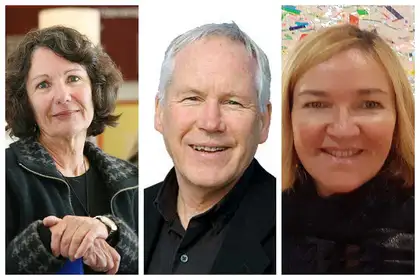
Celebrating 30 years of impactful research in Critical Health Psychology (from left) Professor Christine Stephens, Professor Kerry Chamberlain and Professor Sarah Riley.
During a year in which we have faced one of the biggest global health challenges of this century, Massey University this week marks 30 years of critical health psychology teaching and research.
A professor in critical health psychology, Sarah Riley, says it is a significant time to “reflect on Massey’s contribution to establishing a critical version of health psychology interested in the social, political and cultural dimensions of health and illness, with the ultimate aim of reducing human suffering and promoting improved quality of life, especially among vulnerable members of society.”
The global COVID-19 pandemic provides an example of why critical health psychology is important, she says. “The pandemic represents significant challenges, not only for examining how populations have responded to public health measures (like physical distancing, wearing face masks, and hand washing) but also for investigating social justice rooted responses to this global event,” says Professor Riley, who is based at Massey’s Wellington campus.
“The pandemic has brought simmering inequities to the surface in Aotearoa New Zealand and globally, laying bare underlying patterns of unfairness. These include, for example, which members of society are likely to be ‘essential workers’, care for sick family members, or have pre-existing conditions. Critical Health Psychology, with its focus on social systems is well-placed to contribute to systemic responses, rather than band-aid solutions.”
Massey has been “a leading light in critical health psychology, and this year is celebrating the first health psychology paper led by Professors Kerry Chamberlain and John Spicer in 1990, which brought new ideas to students’ attention and set the trajectory for an amazing body of world-leading and locally impactful scholarship,” she adds.
“From the 1990s onward, Massey University’s School of Psychology became a ‘cradle of the critical approach’, with action research projects, critical psychology theorising, critical approaches to feminism and the evolving Critical Health Psychology programme.”
A research day and celebration this week (2-3 December) at the Auckland campus, marks the contribution of the diverse scholars and current researchers on topics such as healthy ageing; food/eating; breastfeeding; menstrual issues; gender and sexuality and providing needle exchanges, to managing cancer and other chronic health conditions. “A diverse range of topics but all connected with a concern with an understanding of health as a form of social justice,” she says.

The global COVID-19 pandemic has highlighted why critical health psychology research is important.
What differentiates critical health psychology as a discipline?
“Its focus is on the person in context – that if we want to understand why people think and behave the way they do, we need to look at the social, political, economic and material factors shaping their thoughts, feelings and decision-making,” says Professor Riley.
Otherwise, it is easy to blame the victim or suggest implementing policy or interventions that can do more harm than good, says Professor Riley, who is presenting her work at the research day on the contradictory messages young women get about ‘good sexuality’ as part of a collection of work focusing on reproduction and sexual justice.
To kick off the two-day celebrations, Professor Kerry Chamberlain and Professor John Spicer will give a talk about their work in health psychology as founders and champions of Massey’s critical health psychology programme, followed by a question and answer session. .
As part of the student research day on December 3, Professor Christine Stephens will give a keynote address on critical health psychology that makes a difference, as well as sharing highlights of her exceptional career and the lessons she has learnt about how to influence policy through research in the area of health and ageing in Aotearoa. She co-leads the Health in Ageing Research Team (HART) at Massey’s School of Psychology, which has been surveying the experiences of older New Zealanders for more than 10 years and made numerous recommendations on social policy in regard to housing, work, social life, technology and more.
Speakers include alumna Catherine Trezona, National Manager of Altogether Autism, and current students:
Kaitlin Henderson (PhD)
Most mothers in New Zealand will attempt breastfeeding, return to employment, and access early childhood education (ECE) care within the first year of their child’s life. There is a great interest in promoting and increasing national breastfeeding rates, yet little research exploring how ideals of motherhood influence breastfeeding women once they return to employment.
Jess Tappin (PhD)
Her research explores the ways in which young women learn about and make sense of female sexuality, desire and pleasure. In Aotearoa, these topics are not often discussed openly or positively in formalised sexuality education, which means young women seeking to form an understanding of their sexuality must turn to other sources – media, friends, family and porn – which often draw on ideas that construct women as passive sexual objects, criticise female sexual agency or prioritise the role of women as pleasing men.
Ellie Roberts (Masters)
As a reusable menstrual product (RMP), the menstrual cup offers women a cost-effective, safe and environmentally conscious means of menstrual management. Her study investigates how women understand menstrual cup use, with a view to generating greater understanding of the social factors that may support menstrual cup use in order to promote health, social and environmental justice.
Olivia Bloom (Masters Practicum)
Her project was designed to enhance social connection between people with intellectual disabilities during the COVID-19 lockdown. This project aims to promote and support the Peer Support Network (PSN) and demonstrate the importance of social connections for people with intellectual disabilities.
To register to attend for either of these two events please click on the links:
More about health psychology at Massey and thought pieces on responses to COVID-19.